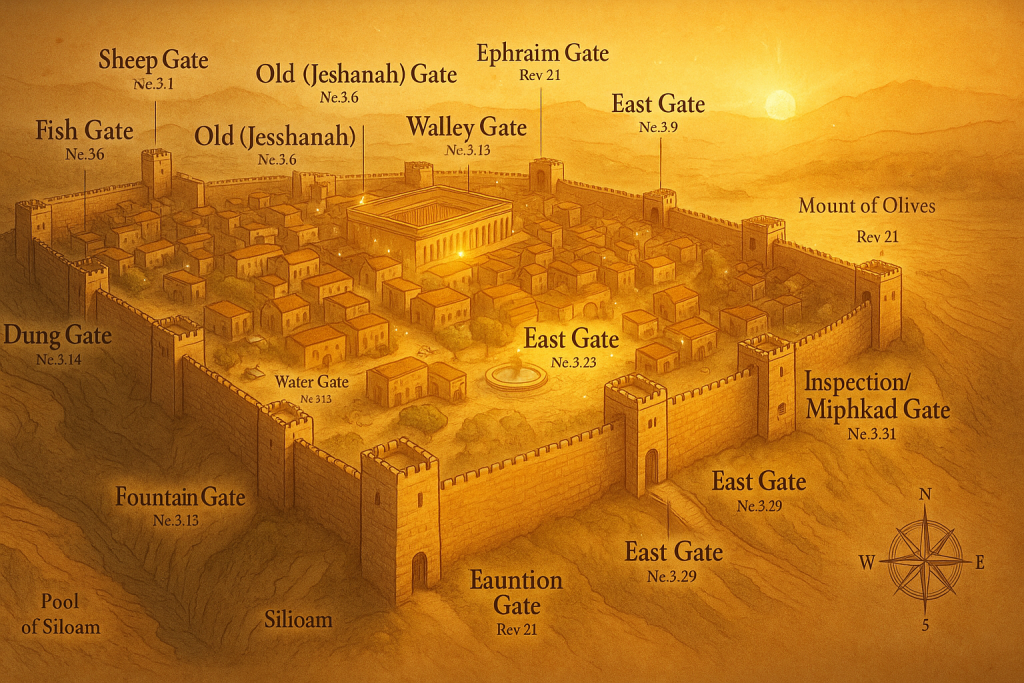The phrase decree and declare prayer has become widely used in many Christian circles today, often associated with the idea of praying with authority and confidence in God’s Word. At its heart, this expression reflects an active faith one that not only believes in God’s promises but also speaks them out loud as an affirmation of trust and alignment with His will.

This practice emphasizes that words carry spiritual weight. When believers declare God’s truth, they are not creating new realities by human power but echoing what God has already spoken through Scripture. Verses such as Job 22:28 “You will also decree a thing, and it will be established for you” and Mark 11:23, where Jesus teaches about the power of faith-filled words, are often referenced to support this perspective. Many Christians interpret these passages as encouragement to speak words of life, blessing, and faith rather than doubt or fear.
However, the true essence of decree and declare prayer is not about commanding outcomes but about confessing what God has promised. It invites believers to participate in God’s work through prayer, using their voice to affirm His truth. When spoken with humility and conviction, such declarations strengthen faith, align the heart with divine purpose, and remind the soul that God’s Word never returns empty.
Read also our article about: Biblical Meaning of Ring in Dreams.
Through this understanding, decree and declare prayer becomes more than a modern expression it becomes a spiritual discipline rooted in the timeless power of God’s promises.
Biblical Foundation of Decreeing and Declaring
To understand whether decree and declare prayer has a solid biblical foundation, it is essential to look closely at how the Bible portrays the power of spoken words and divine authority. Throughout Scripture, we find moments when God Himself speaks creation into existence “And God said, ‘Let there be light,’ and there was light” (Genesis 1:3). His Word is not merely descriptive; it is creative and sovereign. This sets the ultimate model for all declarations of truth and faith.
Prophets in the Old Testament also declared God’s promises and judgments, not from personal will, but as vessels through whom God’s Word was revealed. For instance, Isaiah, Jeremiah, and Ezekiel proclaimed divine decrees that shaped nations and hearts. Their authority to declare came directly from God’s instruction, not from self-determination.
In the New Testament, Jesus emphasizes the power of faith-filled speech in Mark 11:23, teaching that faith can move mountains when it aligns with God’s purposes. The apostles continued this pattern, speaking words of healing, blessing, and truth yet always under the leading of the Holy Spirit.
These examples suggest that decree and declare prayer can have meaning when it flows from Scripture and is guided by divine will. However, it becomes problematic when used as a formula to command outcomes apart from God’s sovereignty. The Bible warns against speaking presumptuously or treating spiritual authority as a tool for personal gain (Deuteronomy 18:20, James 4:15).
Therefore, the biblical foundation of decreeing and declaring is not found in human control over circumstances, but in aligning our declarations with God’s revealed Word. When believers declare His promises such as peace, healing, or restoration they participate in faith rather than manipulation. The power lies not in the voice of man but in the eternal truth of God’s Word, which remains unshakable and alive.
Faith and Authority in Decree and Declare Prayers
True spiritual authority in decree and declare prayer begins with faith that is rooted in submission, not control. Genuine faith does not attempt to bend God’s will to human desires; rather, it aligns the believer’s heart with divine purpose. When someone declares a promise or truth from Scripture, the goal is not to impose an outcome but to affirm trust in what God has already spoken.
Jesus Himself demonstrated this perfect balance between authority and surrender. He spoke with divine power, commanding storms to cease, demons to flee, and the sick to be healed yet every act of authority flowed from His complete obedience to the Father’s will. In John 5:19, Jesus explains, “The Son can do nothing by Himself; He does only what He sees the Father doing.” This reveals the secret of true authority: it comes from alignment with God, not independence from Him.
The apostles followed this same example. In the book of Acts, Peter declared healing to the lame man at the temple gate, but his words were anchored in faith in Jesus’ name, not his own ability. Paul, too, spoke boldly in the Spirit, yet always acknowledged that power and results belong to God alone.
Therefore, decree and declare prayer becomes meaningful when faith and authority walk hand in hand. Declaring God’s promises is powerful because it springs from confidence in His character and Word. But this authority must always remain under divine direction. Faith without humility leads to presumption; faith expressed through submission leads to transformation.
When believers declare God’s truth with reverence and trust, they step into the kind of spiritual authority that reflects Christ Himself strong, yet surrendered; confident, yet dependent on the will of God.
Common Misunderstandings About Decree and Declare Prayer
One of the biggest misconceptions about decree and declare prayer is the belief that it gives people the power to control outcomes through their words alone. This misunderstanding often turns a biblical principle into something resembling “positive thinking” or even “spiritual magic.” While the Bible teaches that words hold power, it never suggests that human speech can replace God’s sovereign will or authority.
In reality, there is a crucial difference between declaring God’s promises and decreeing personal outcomes. Declaring means affirming what God has already spoken for example, proclaiming His faithfulness, mercy, or provision based on Scripture. It is an act of faith that aligns the believer with divine truth. On the other hand, decreeing outcomes for personal desires, such as wealth, success, or instant miracles, can slip into the dangerous idea that faith is a tool to manipulate reality rather than a relationship with God.
This confusion often arises from taking verses like Job 22:28 out of context, assuming that any believer can “decree a thing” and make it happen. However, in that passage, the words are spoken by Eliphaz, a man whose advice God later rebukes. The lesson is that authority without discernment can lead to distortion.
Decree and declare prayer should never be treated as a formula or chant. Instead, it must flow from a heart anchored in Scripture and humility. True declarations reflect faith in God’s promises not faith in one’s own power. When practiced with discernment, it strengthens trust in God; when misunderstood, it risks turning prayer into self-centered wishful thinking.
Recognizing this difference helps believers avoid empty declarations and focus instead on speaking words that echo the eternal truth of God’s Word, not the fleeting desires of human will.
Read also our article about: Biblical Meaning of 1222.
How to Practice Decree and Declare Prayer Wisely
To practice decree and declare prayer with wisdom is to combine bold faith with deep humility. This kind of prayer is not about commanding God but about agreeing with His Word. The foundation must always be Scripture God’s revealed truth because every declaration gains power only when it aligns with His promises and character.
Begin by filling your heart and mind with the Word of God. Before declaring anything, reflect on what the Bible actually says about your situation. For example, if you are praying for peace, declare what Philippians 4:7 promises: “The peace of God, which surpasses all understanding, will guard your hearts and minds in Christ Jesus.” Speaking this truth out loud is not an act of pride but an affirmation of faith in what God has already established.
Second, pray with humility. Recognize that your words carry weight only when surrendered to God’s will. A wise declaration begins with phrases like “Lord, according to Your Word, I declare…” showing that the authority comes from Scripture, not personal ambition.
Third, keep your focus on Christ rather than results. The goal of decree and declare prayer is not self-promotion or material gain, but spiritual growth and intimacy with God. As you declare biblical truths, allow them to reshape your thoughts, strengthen your trust, and inspire others around you.
Finally, remember that true faith is steady, not forceful. It is possible to be confident in God’s power without becoming spiritually arrogant. When declarations flow from love, reverence, and obedience, they bring peace, hope, and transformation not only to your circumstances but to your heart.
Practicing decree and declare prayer in this balanced way turns your words into instruments of faith, building a life firmly rooted in Christ and guided by the unchanging truth of His Word.
Living the Power of Words: Speaking Life Through Scripture
The journey through decree and declare prayer reveals a powerful truth our words carry influence when they echo the heart of God. From creation to Christ’s teachings, Scripture consistently shows that spoken words can build faith, release hope, and bring light into darkness. Yet, this power does not originate in human will; it flows from divine truth expressed through faith and obedience.
When believers decree and declare according to God’s Word, they participate in His ongoing work of transformation. Every declaration grounded in Scripture becomes an act of partnership with the Creator not to manipulate outcomes, but to align the soul with His eternal purposes. It is faith in motion, anchored in the understanding that God’s Word accomplishes what He intends.
The key lesson is balance: speak boldly, but with humility; declare truth, but remain surrendered to divine wisdom. Faith-filled words have the power to change atmospheres, heal hearts, and inspire perseverance, but only when they reflect the nature and will of God.
As you continue to grow in decree and declare prayer, remember that every word spoken in faith should breathe life to yourself, to others, and to your walk with Christ. Let your declarations be echoes of Scripture, carrying peace, strength, and renewal wherever they are spoken. Through this practice, your voice becomes a vessel of God’s truth, shaping your world with grace and unwavering hope.


